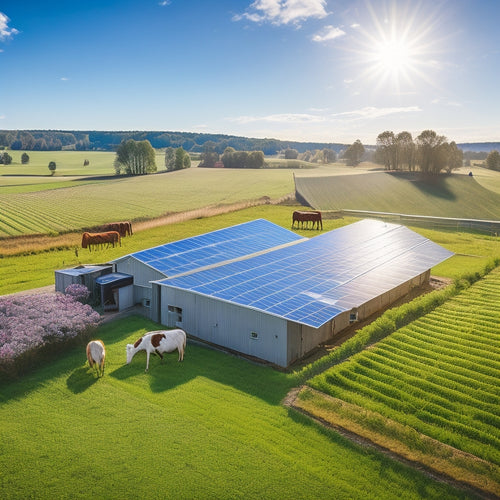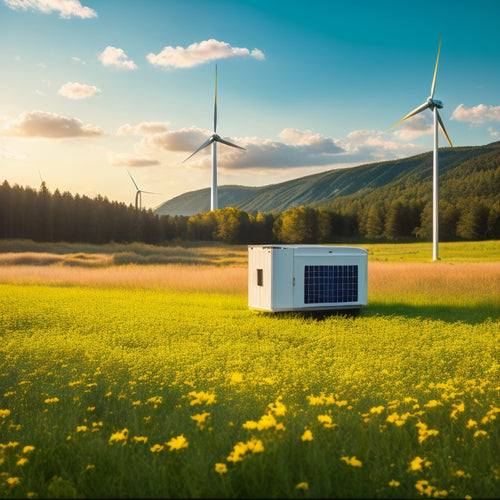
Costs and Savings of Greywater Recycling Systems
Share
Greywater recycling systems can greatly reduce your water bills and promote sustainable practices in your home. Initial installation costs vary based on complexity and local regulations, so it is crucial to obtain multiple quotes for better budgeting. Over time, you could save between $700 and $1,100 annually on water expenses, aligning these systems' cost-efficiency with that of solar power solutions. Factors like household size and system capacity also influence overall savings and effectiveness. Understanding these elements helps you make informed decisions about installation and usage, creating the opportunity to further investigate the advantages of greywater recycling.
At a Glance
- Initial installation costs for greywater recycling systems vary based on plumbing complexity and local regulations, with hidden expenses to consider.
- Long-term savings can range from $700 to $1,100 annually by reducing water usage for non-potable applications.
- Key components like treatment systems and storage tanks are essential for effective greywater recycling and require regular maintenance.
- Larger households may need systems with greater capacity to handle increased greywater output, affecting cost-effectiveness and installation complexity.
- Greywater systems promote resource efficiency, aligning with sustainable practices and reducing the load on municipal wastewater treatment facilities.
Environmental Impact Reduction
Implementing greywater recycling systems considerably contributes to water resource conservation, allowing you to reuse water that would otherwise be wasted.
By integrating sustainable practices such as solar energy solutions, these systems not only reduce the demand on freshwater supplies but also enhance energy efficiency in homes.
Additionally, these systems help mitigate the pollution associated with wastewater treatment.
Consequently, you'll find that adopting such technologies not only conserves essential resources but also enhances overall environmental health.
Water Resource Conservation
Water conservation plays an essential role in mitigating environmental impacts associated with water scarcity and pollution. Implementing greywater recycling systems is one effective way to adopt sustainable practices that enhance conservation strategies. By reusing greywater, you not only reduce the demand on freshwater resources but also contribute to ecosystem preservation. This practice aligns well with urban planning initiatives aimed at creating resilient cities in the face of climate change.
Moreover, greywater systems can facilitate groundwater recharge, which is critical for maintaining local aquifers and ensuring long-term water supply stability. As you integrate these systems into your daily life, you actively support public awareness efforts that highlight the importance of water resource conservation.
It's crucial to recognize that every drop counts, especially as water scarcity becomes an increasingly pressing issue. By embracing greywater recycling, you contribute to a culture of conservation, nurturing climate resilience within your community. Your actions can inspire others to follow suit, amplifying the collective impact on water sustainability.
Ultimately, the adoption of greywater systems serves as a proactive response to the challenges posed by dwindling water resources, ensuring a more sustainable future for all.
Pollution Reduction Benefits
Greywater recycling systems considerably contribute to pollution reduction by minimizing the volume of wastewater that enters treatment facilities and natural water bodies. By reusing water from sinks, showers, and laundry, you directly decrease the load on municipal treatment systems, which often struggle with high volumes of sewage. This reduction helps lower the risk of overflows and pollution incidents, protecting local ecosystems.
Implementing these systems can lead to significant health benefits for your community. Cleaner water bodies reduce the likelihood of harmful algal blooms and other pollution-related health hazards.
Additionally, as you advocate for greywater recycling, you raise community awareness about sustainable practices. This awareness nurtures a culture of responsibility toward water use, encouraging your neighbors to reflect on their environmental impact.
Moreover, by promoting greywater systems, you contribute to a collective mindset focused on conservation and pollution prevention. This shared commitment can lead to better policies and practices that prioritize the health of both people and the environment.
Ultimately, integrating greywater recycling into daily life not only benefits individual households but also serves as an essential step toward a healthier, more sustainable community.
Cost-Effective Water Source
When considering greywater recycling systems, the initial installation expenses can be significant.
However, you must also evaluate the long-term savings potential these systems offer through reduced water bills and less reliance on municipal sources.
Like solar power grids, which can lead to significant energy savings, greywater systems can also provide cost-efficiency over time by reducing overall resource consumption significant energy savings.
Analyzing both factors will help you determine the overall cost-effectiveness of implementing such a system.
Initial Installation Expenses
Installing a greywater recycling system can involve significant initial expenses, but it's important to take these costs into account against the potential long-term savings. A range of factors contributes to these installation challenges, including the complexity of your existing plumbing, local regulations, and the specific type of system you choose.
You're likely to encounter costs from components like filtration and storage units, which can vary widely.
When considering budget considerations, it's vital to obtain multiple quotes from licensed professionals. This will give you a clearer illustration of the overall investment required. Keep in mind that hidden expenses may arise, such as permits and unexpected modifications to your plumbing.
Additionally, remember to factor in the potential for ongoing maintenance expenses, which can affect your budget over time.
While the initial installation costs might seem intimidating, they can be offset by the benefits of reduced water bills and enhanced sustainability. Analyzing your budget and assessing these considerations will help you make a well-informed decision about whether a greywater recycling system aligns with your financial and environmental goals.
Long-Term Savings Potential
The potential for long-term savings with greywater recycling systems is significant, as they provide a cost-effective water source for various non-potable applications. By utilizing greywater, you can drastically reduce your operational costs related to water usage. This recycling process not only maximizes resource efficiency but also minimizes the strain on municipal water supplies.
In addition to reduced water bills, you'll also see maintenance savings. Greywater systems are designed to be sturdy, requiring less frequent repairs compared to traditional plumbing systems. Here's a breakdown of potential savings:
| Savings Category | Estimated Annual Savings |
|---|---|
| Water Bill Reduction | $300 - $500 |
| Maintenance Costs | $150 - $300 |
| Pumping Costs | $100 - $200 |
| Chemical Treatments | $50 - $100 |
| Total Potential Savings | $700 - $1,100 |
Adopting greywater recycling systems not only supports sustainability but also enables you to take control of your water resources, leading to significant long-term financial benefits. By integrating such systems, you're not just saving money; you're investing in a resource-efficient future.
System Components Overview
To effectively implement a greywater recycling system, you need to understand its key components and the installation requirements. Each component plays a critical role in guaranteeing the system operates efficiently and meets regulatory standards.
Regular maintenance of these systems is essential, much like battery maintenance tips that guarantee the longevity and performance of energy storage solutions.
Key System Components
Understanding the key components of greywater recycling systems is fundamental for effective implementation and ideal performance. These systems primarily consist of several critical elements that work together to guarantee efficient greywater treatment and reuse.
Firstly, filtration technologies play a pivotal role in removing contaminants from greywater. You'll encounter various filtration methods, including mechanical filters, sand filters, and membrane systems. Each type offers unique advantages regarding maintenance and effectiveness, so selecting the right one aligns with your specific water quality needs.
Next, a storage tank is essential for holding treated greywater until it's ready for use. The size and material of the tank can considerably impact system efficiency and longevity.
Additionally, a pump system is necessary to distribute the recycled greywater throughout your property. Proper sizing and selection of pumps help maintain adequate pressure and flow rates.
Lastly, routine system maintenance is fundamental to guarantee ideal performance. Regular checks of filters, tanks, and pumps can prevent clogs and prolong the lifespan of your greywater recycling system.
Installation Requirements Overview
When considering the installation of greywater recycling systems, several vital requirements must be addressed to guarantee ideal functionality and compliance with local regulations.
First, you'll need to evaluate the system types available, such as branched drain systems or integrated treatment systems, as each has unique installation challenges.
Next, confirm that your plumbing infrastructure can accommodate the selected system. Modifications may be necessary to redirect greywater from sinks, showers, and laundry to the recycling system.
Additionally, verify that your installation aligns with local building codes and health regulations, which can vary considerably by region.
You should also consider the site's layout. A suitable location for the system components, such as storage tanks and treatment units, is essential for optimal operation.
Accessibility for maintenance and potential expansion is another vital factor.
Selecting Based on Household Size
When selecting a greywater recycling system, consider the size of your household to guarantee ideal performance.
Evaluating your energy needs through consumption patterns can help determine the right system for your water usage. Larger households typically require systems with greater capacity to handle increased water output.
Proper alignment between household size and system capacity is essential for maximizing efficiency and cost-effectiveness.
Household Size Considerations
Typically, selecting a greywater recycling system involves careful consideration of your household size, as the volume of water generated will directly impact the system's efficiency and cost-effectiveness.
Understanding family interactions is essential; larger households usually produce more greywater, necessitating a system capable of handling increased flow. Conversely, smaller families or single-person households may require a less complex setup, which can lead to lower initial costs and maintenance.
Additionally, your lifestyle choices play a significant role in determining the right system for you. If your household engages in activities that generate substantial greywater—such as frequent laundry or extensive gardening—you'll need a solution that can efficiently recycle that water.
On the other hand, if your water usage is minimal, a simpler system might suffice.
Evaluating these factors guarantees you select a greywater system that aligns with your specific needs, thereby maximizing both performance and savings.
Ultimately, the right choice won't only cater to your current household size but also accommodate potential changes in family interactions or lifestyle choices over time.
System Capacity Requirements
Selecting a greywater recycling system requires careful assessment of system capacity requirements, particularly in relation to your household size. The effectiveness of your system hinges on its ability to meet your household's water usage patterns.
When you're evaluating system design, consider factors such as the number of occupants, daily water consumption, and the types of fixtures in use.
Capacity planning is essential to guarantee that the system can handle peak usage without overwhelming its components. For instance, a household of four will likely generate more greywater than a single-person residence.
Thus, it's critical to calculate the average daily greywater output, which typically includes water from sinks, showers, and washing machines.
Once you've established this baseline, you can select a system that matches or exceeds your needs. Oversizing can lead to unnecessary costs, while undersizing may result in system inefficiencies or failure to recycle enough water.
Higher Water Reuse Efficiency
Higher water reuse efficiency in greywater recycling systems greatly improves irrigation potential.
By effectively capturing and treating greywater, you can supplement your irrigation needs, reducing reliance on potable water sources.
This not only lowers costs but also contributes to sustainable water management practices.
Increased Irrigation Potential
When considering the benefits of greywater recycling systems, you'll find that they greatly enhance irrigation potential by maximizing water reuse efficiency. By capturing and treating water from sinks, showers, and washing machines, these systems allow you to repurpose significant amounts of water for irrigation. This directly contributes to increased irrigation efficiency, enabling you to sustain environments and gardens even in water-scarce conditions.
The adaptability of greywater systems further supports diverse irrigation needs. Whether you're watering a small garden or maintaining expansive lawns, these systems can be customized to fit your specific requirements. They can seamlessly integrate with existing irrigation infrastructure, allowing for efficient distribution without extensive modifications.
Moreover, the use of greywater not only conserves potable water but also reduces the demand on municipal water supplies, promoting sustainability. By implementing greywater recycling, you take a proactive step towards responsible water management, ensuring that your irrigation practices are both eco-friendly and cost-effective.
As you investigate this option, you'll uncover not just the financial savings, but the enablement that comes from making informed choices that benefit both your environment and the ecosystem.
Frequently Asked Questions
What Maintenance Is Required for Greywater Recycling Systems?
For greywater recycling systems, you'll need routine inspections and filter cleaning to guarantee peak performance. Regular maintenance prevents clogs and system failures, allowing you to enjoy the benefits of efficient greywater reuse with minimal hassle.
Can Greywater Systems Be Installed in Existing Homes?
Yes, you can install greywater systems in existing homes, but installation challenges may arise. Assess your plumbing layout and system compatibility to guarantee an efficient and effective integration with your current water management infrastructure.
Are There Any Legal Restrictions on Greywater Use?
You might feel uncertain about greywater regulations, but understanding them is essential. Many areas impose restrictions due to health concerns. Familiarize yourself with local laws to guarantee your greywater use remains compliant and safe.
How Does Greywater Recycling Affect Property Value?
Greywater recycling can enhance property appreciation by increasing market demand. Buyers often seek sustainable features, and implementing such systems can position your property favorably, appealing to environmentally conscious consumers while potentially elevating resale value.
Can Greywater Systems Be Used in Drought-Prone Areas?
Yes, you can use greywater systems in drought-prone areas. These systems greatly enhance water conservation, effectively mitigating drought impact by recycling water for non-potable uses, thereby promoting sustainable practices and reducing reliance on limited freshwater resources.
Explore More
In the garden of sustainability, greywater recycling systems are the seeds you plant for a thriving future. By understanding their components and tailoring them to your household, you cultivate a cost-effective water source that flourishes with higher reuse efficiency. As you nurture this system, you not only reduce your environmental impact but also reap the savings that come with wise water management. Seize this opportunity to change your home into an oasis of resourcefulness and responsibility.
Related Posts
-

What Do I Need to Know About Farm Solar Panels
When considering farm solar panels, you need to assess costs, benefits, and technical specifics. Initial investment c...
-

Sustainable and Eco-Friendly Generators for a Reduced Carbon Footprint
Sustainable and eco-friendly generators are perfect for cutting your carbon footprint and increasing energy efficienc...
-

Commercial Solar Energy
As you consider powering your business with commercial solar energy, you'll uncover it offers a triple benefit: signi...


